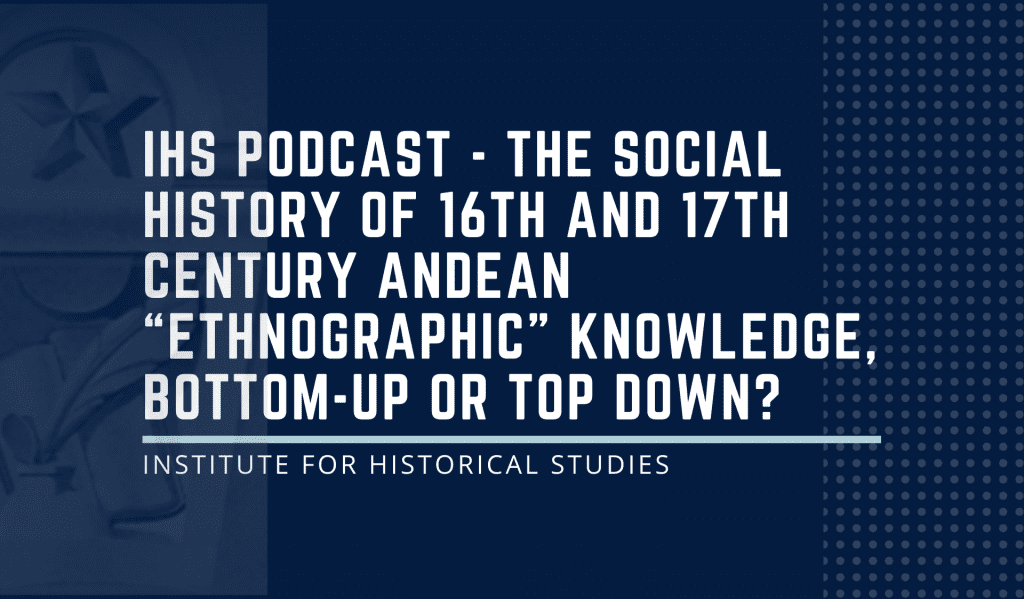
IHS podcasts are a new podcast series initiated by the Institute for Historical Studies’ Director, Dr. Jorge Cañizares-Esguerra. They are paired with weekly workshops and are designed to foster discussion between graduate students and distinguished scholars in the field. Along with graduate students and guests, each episode features Dr. Cañizares-Esguerra and Ashley Garcia, a PhD Candidate in History at UT Austin. This podcast is recorded in connection with a roundtable, The Relaciones Geográficas of the Spanish Caribbean: Local Knowledge on Human Populations in the cabildos of Santa Marta, Venezuela, and Puerto Rico (c. 1570-1590), presented by Rafael Nieto-Bello University of Texas at Austin, on October 11th. Details can be found here.
Introduction
In this podcast with Jose Carlos de la Puente, we explore the ways in which a cadre of indigenous paralegal natives created much of the “ethnographic” knowledge in sixteenth- and seventeenth-century colonial central Andes (Peru), usually attributed to European elite intellectuals.
Most knowledge (ethnographic or not) emerged in the context of factional conflict and legal squabbles. We explore the origins of the Huarochiri manuscript (an indigenous colonial bible for the regions of Huarorchiri, not unlike the colonial Popol Vuh (for the Maya) in squabbles among factions of indigenous cabildos that used inquisitorial probes (extirpation of idolatry) to denounce potential and actual rival factions. We have long attributed ethnography to Jesuits, yet it was indigenous scribal knowledge produced among rival cabildos that generated this and other ethnographic religious texts.
De la Puente sheds abundant light on the vast encyclopedia of ethnographic knowledge that is Guaman Poma’s Primera nueva cronica y buen gobierno. Based on extensive archival research, De la Puente has reconstructed the many ways in which Guaman Poma collected both information and experience in various types of colonial paperwork and administrative roles, participating since the 1560s as a paralegal of the church (extirpations of idolatries) and the lay state of corregidores and viceroys (land conflicts and litigation).
Guaman Poma got also involved as administrator of indigenous commons in regions like Huamanga, allegedly representing the interest of commoners vs curaca—cacique elites. Guaman Poma’s role as administrator of commons gained him access to information on all types of tribute as well as on new types of property and financial instruments. Guaman Poma, the “Indian”, was thoroughly familiar with the everyday paperwork and financial instruments of communities and the “Spanish” colonial bureaucracy. His ethnographic knowledge was the result of his scribal bureaucratic role and is a reference to current indigenous practices not ancient traditions.
Finally, De la Puente explores how legal and ethnographic categories scholars have attributed to top down colonial mandates by corregidores, viceroys, oidores, council magistrates, and ultimately monarchs were rather the product of local conflict within communities. The new terms emerged in the testimonies of factional parties in legal conflict.
~ Jorge Cañizares-Esguerra
Guests
Dr. Jose Carlos de la Puente is a scholar of native Andean peoples and the Spanish empire. The bulk of his work is devoted to understanding the formation of colonial indigenous legal, political, and literate cultures. His scholarship has made interventions in several interrelated fields, including native accounting technologies, the colonial Inka nobility, indigenous intellectuals and intermediaries, and colonial systems of land tenure and territorial representation. His current book-length project reexamines the history of the Andean colonial commoning and uncommoning practices through the lenses of land and tenure. Andean Cosmopolitans, his latest book, reconstructs the world of native litigants and favor seekers at the royal court of the Spanish Habsburgs. His earlier monograph, Los curacas hechiceros de Jauja, centers on witchcraft accusations launched by indigenous lords against their political rivals in late-seventeenth-century Peru.
Rafael Nieto-Bello is a second-year Ph.D. student in the Department of History at UT Austin. He obtained a double B.A. in History and Political Science and a double minor in Philosophy and German Language in the Universidad de Los Andes (Bogotá, Colombia, 2018). In 2021, he was awarded the Fellowship on “Race and Caste” from the Institute of Historical Studies (IHS) for preparing a grant proposal. Additionally, he obtained the Lozano Long Centennial Fellowship from LLILAS Benson for the coordination of the 2022 Lozano Long Conference “Archiving Objects of Knowledge with Latin American Perspectives.” His research is a history of knowledge from the 16th-century Spanish municipalities. He explores how town communities from diverse ethnic backgrounds described and claimed to know their populations and environments through corporate efforts placed on the local councils.
Hosts
Jorge Cañizares-Esguerra is Alice Drysdale Sheffield Professor of History at the University of Texas at Austin and the Director of the Institute for Historical Studies.
Ashley Garcia is a PhD candidate at the University of Texas at Austin. Her research includes 19th century political history, American communitarianism, and American political thought. Her dissertation, “An American Socialism: The Associationist Movement and Nineteenth Century Political Culture,” explores America’s most popular utopian socialist program: the Associationist movement of the 19th-century. Ashley has also completed a Portfolio in Museum Studies as her secondary PhD field.
The views and opinions expressed in this article or video are those of the individual author(s) or presenter(s) and do not necessarily reflect the policy or views of the editors at Not Even Past, the UT Department of History, the University of Texas at Austin, or the UT System Board of Regents. Not Even Past is an online public history magazine rather than a peer-reviewed academic journal. While we make efforts to ensure that factual information in articles was obtained from reliable sources, Not Even Past is not responsible for any errors or omissions.



